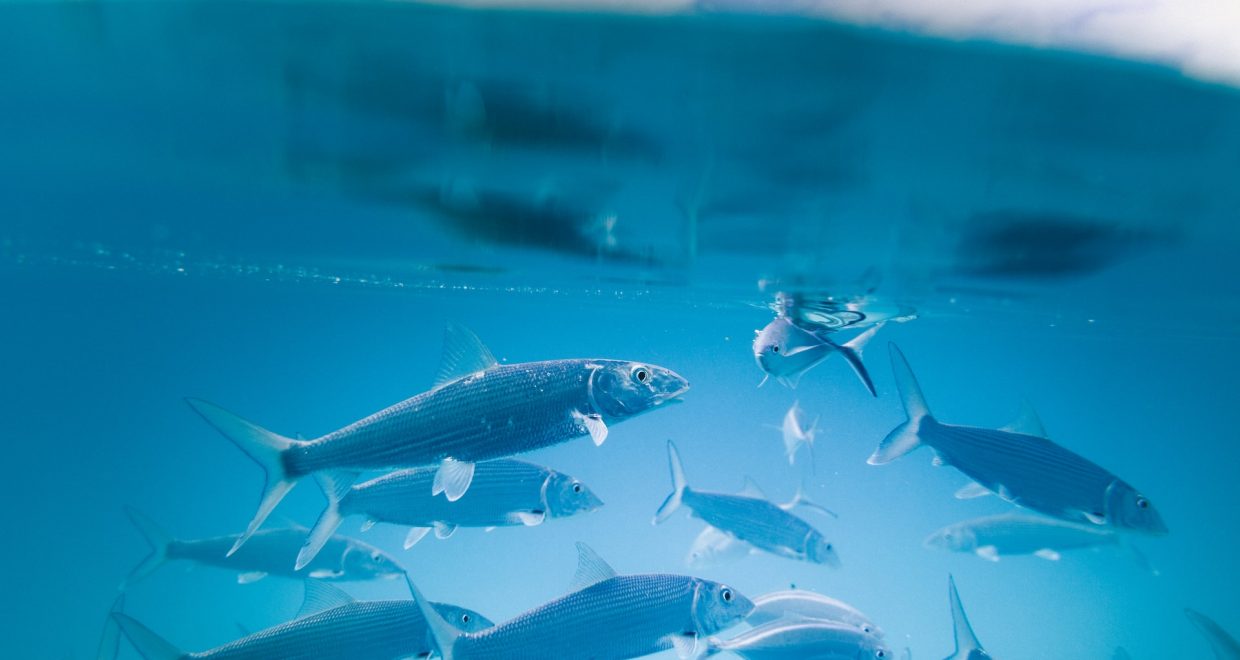Fishing and Fishing-Related Activities: A Deadly Mutualism in the IUU Fishing Chain
Should fisheries support vessels play a more active role in addressing illegal, unreported, and unregulated (IUU) fishing and its associated crimes?
IUU fishing is a broad term encompassing a wide range of fishing activity that contravenes international, regional, and national laws and regulations. IUU fishing vessels can remain at sea for extensive time without any port visit and are, therefore, able to elude oversight and control. Oceana reported that some fishing vessels could even spend more than 500 days at sea without any return to port. The nature of such fishing activity, particularly in waters beyond national jurisdiction, allows other crimes to thrive, either crimes that are closely linked with the fishing operation or those with no direct connection with the fishing operation but take place on fishing vessels or during a fishing operation. One notable example is the prevalence of modern slavery at sea, which is well documented in some countries, such as in the Thai and Indonesian fishing industries. Prolonged periods of fishing activity have been made possible by a network of fisheries support vessels supplying fuel, food, and even crews to fishing vessels. These support vessels, notably refrigerated cargo vessels (reefers) and bunkering vessels (bunkers), provide vital support to the lifeline of IUU fishing and its associated crimes through at-sea transhipment and bunkering, yet they are generally under discussed in the legal discourse.
Role of Support Vessels in IUU Fishing and Associated Crimes
For the purpose of this blog, the term “support vessels” is used as a blanket term to include any non-fishing vessel operating in support of a fishing vessel. This may include processing, transport, transhipment, bunkering and supply vessels. A strict delineation between the different types of support vessels is difficult to draw since a vessel can perform more than one supportive function. The term “support vessels” is not defined in any international agreement, but several Regional Fisheries Management Organisations (RFMOs), e.g. WCPFC, have adopted a definition of “fishing vessels” that includes support vessels. Some RFMOs even interpret any at-sea operation in direct support of fishing as “fishing”, e.g. CCSBT. On the contrary, the Agreement on Port State Measures (PSMA) distinguishes between “fishing” and “fishing related activities.” The FAO Global Record, which documents fishing vessels and vessels involved in fishing-related activities, appears to follow the same categorisation. Under PSMA, “fishing related activities” are:
“any operation in support of, or in preparation for, fishing, including the landing, packaging, processing, transhipping or transporting of fish that have not been previously landed at a port, as well as the provisioning of personnel, fuel, gear and other supplies at sea.”
Although it is legal for support vessels to provide offshore services to fishing vessels, an FAO study found that they have allowed fishing vessels to underreport their catch and obscure its origins; thus contributing to IUU fishing. At-sea transhipment also heightens the risks of forced labour and human trafficking on fishing vessels. Without fishing vessels going to port to unload catch, refuel or resupply, crews that are being held in slave-like conditions on board such fishing vessels are unable to escape or to seek help from authorities—making them de facto prisoners of the sea. Human Rights Watch has also found cases of trafficked and coerced fishers being traded or transferred between vessels during transhipments, thereby suggesting that human rights abuses on board fishing vessels can start from non-fishing vessels.
While support vessels are advantageous to IUU fishing operations, arguments have been made that they can also be useful for law enforcement to identify potential IUU fishing hotspots. Unlike many fishing vessels, fisheries support vessels are required to have IMO numbers and to transmit their locations using an Automatic Identification System (AIS). By tracking their movements using AIS data, authorities can analyse fishing vessel-reefer encounters at sea to investigate any potential occurrence of IUU fishing and other illegal activities. Arguably, fisheries support vessels can also serve as first responders of modern slavery at sea as they likely hold information about these criminal networks. These support vessels should be in a better position to identify fishing crew members as trafficked or vulnerable when they make direct contact with fishing vessels during at-sea transhipment or bunkering, and then assist or refer them to competent authorities.
Obligations of Support Vessels vis-à-vis IUU Fishing and Associated Crimes
Given the significance of support vessels for fishing vessels and their capacity to play a vital role in addressing IUU fishing and associated crimes, particularly modern slavery at sea, are there legal obligations that prohibit support vessels from providing services to vessels suspected of IUU fishing or its associated crimes and require them to report such vessels to competent authorities?
As the Constitution for the Oceans, the United Nations Convention on the Law of the Sea (UNCLOS) contains no specific provision in respect of IUU fishing or its associated crimes. One would need to examine any inference that can be drawn from the general duties contained in UNCLOS, for instance, the applicability of the slavery provisions under UNCLOS on the issue of modern slavery on board fishing vessels. Whilst it is clear from the ITLOS SRFC Advisory Opinion that flag states of fishing vessels have due diligence obligations under UNCLOS to ensure their fishing vessels are not engaged in IUU fishing in the EEZs of another state, the matter of due diligence obligations upon flag states of vessels servicing IUU fishing vessels has not been specifically raised or addressed before international courts or tribunals.
Indeed, the non-binding International Plan of Action to Prevent, Deter and Eliminate IUU Fishing (IPOA-IUU) has called for flag states to ensure that:
“[…] their fishing, transport and support vessels do not support or engage in IUU fishing. To this end, flag states should ensure that none of their vessels re-supply fishing vessels engaged in such activities or tranship fish to or from these vessels.”
However, PSMA appears to be the only binding international instrument that regulates both fishing vessels and vessels used for, equipped to be used for, or intended to be used for fishing-related activities. Parties to the PSMA are required to designate ports where they shall apply stricter port controls on vessels engaged in IUU fishing or fishing related activities in support of IUU fishing. Such measures include requirements of prior notification, restrictions on port entry, documentation requirements, port inspections, and restrictions on port services. Nevertheless, PSMA only applies to IUU fishing, and does not extend to crimes associated with it.
Considering the linkage between IUU fishing and modern slavery on board fishing vessels, the Work in Fishing Convention is another key treaty that can be harnessed to fight the problems. Under this Convention, port states have the optional jurisdiction to board and inspect labour conditions on board vessels engaged in commercial fishing operations regardless whether the flag state has ratified the Convention or not. The Convention also sets out flag state obligations to effectively exercise its jurisdiction and control with regards to living and working conditions of vessels flying its flag. Unfortunately, ratification to the Work in Fishing Convention is still low compared to the Maritime Labour Convention, which regulates labour standards for commercial shipping.
Because UNCLOS adopts a zonal approach, the extent to which fisheries-related activities are subject to certain obligations vis-à-vis IUU fishing and associated crimes will likely depend on whether such activities are carried out in areas under sovereignty or sovereign rights of a coastal state, or the high seas. If fisheries-related activities take place in waters within the sovereignty of a coastal state, it will be subject to the coastal state’s national laws and regulations. Fisheries-related activities such as transhipment may happen in coastal states’ waters, but experts have found that 65% of transhipment took place within exclusive economic zones (EEZs) and the remaining 35% occurred on the high seas. In the EEZs, coastal states have sovereign rights to explore, exploit, conserve and manage living or non-living natural resources. Although activities such as transporting, transhipping, and bunkering in the EEZs are not exploration or exploitation of natural resources and can be a legitimate activity under the freedom of the high seas, they are more restricted when they have a ‘direct connection to fishing.’ As confirmed by ITLOS in the M/V Virginia G case, bunkering of vessels engaged in fishing is within coastal states’ sovereign rights under Articles 56 and 62(4) of UNCLOS. In other words, coastal states have the competence to regulate vessels engaged in both fishing and fishing-related activities in their EEZs, including vessels that provision fishing vessels.
It should be noted, however, that the rights of a coastal state to regulate fisheries-related activities within its EEZs do not extend to cases of modern slavery on board foreign fishing vessels. In this case, UNCLOS prescribes that high seas provisions shall apply mutatis mutandis to the EEZ, thereby matters other than those falling exclusively under a coastal state’s sovereign rights will be subject to the exclusive jurisdiction of the flag state. UNCLOS only allows several exceptions to this exclusive flag state jurisdiction, including when there is a reasonable ground for suspecting a vessel is engaged in slavery. In such a scenario, support vessels could play their parts by alerting any coast guard vessel who could then exercise a universal right of visit under Article 110 of UNCLOS. The same provision applies to the high seas where fisheries-related activities, such as transhipment, are far more problematic as they are often poorly monitored and controlled.
It is worth noting that the right of visit under UNCLOS does not of itself imply further law enforcement powers beyond boarding, inspection and informing the flag state, unless consent is granted by the flag state or there are other grounds provided by UNCLOS to detain and arrest the vessel, e.g., if inspection reveals the vessel to be stateless. Despite the obligation of every flag state to prevent and punish slavery under Article 99 of UNCLOS, UNCLOS also confers no right of interference and seizure jurisdiction in slavery cases. The travaux préparatoires of UNCLOS indicates some intention to treat slavery in similar fashion as piracy, but in the end, UNCLOS only recognises piracy as a crime subject to universal jurisdiction. It may suggest that there was not the same level of consensus between piracy and slavery when UNCLOS was concluded. While it may be argued that prohibition of slavery has now become an erga omnes obligation, there are likely some disagreements among UNCLOS parties as there remains no support for the exercise of seizure jurisdiction for slavery.
Unlike the EEZs, fisheries-related activities on the high seas may be deemed as one of the high seas’ freedoms. As such, they are subject to the exclusive control and jurisdiction of the flag state where the rules can have varying degrees of stringency. If states are members of RFMOs, they may also be required to comply to more specific transhipment or bunkering measures. For instance, some RFMOs regulate that transhipment at sea shall be made to an authorised carrier vessel and provide a declaration of transhipment. Since RFMOs can have a geographical mandate that consists exclusively of coastal states’ EEZ or high seas or both, and their mandate can also be species-specific in a geographical area, their conservation and management measures may also apply to EEZs. Recent FAO study pointed out that those conservation and management measures also have an impact on the working conditions of fishing crews. RFMOs, such as WCPFC, have adopted a non-binding resolution calling on its member states to ensure fair working conditions on board fishing vessels. Other RFMOs, such as CCSBT, ICCAT, and SPRFMO, also require the presence of an observer on board a carrier vessel during transhipment. However, none of the RFMOs mandate that observers report witnessed human rights violations on board fishing vessels. While the focus has mostly been on fishing vessels, there have also been reports of human rights and safety violations against those observers.
Conclusion
Fishing, particularly the farther it is from the shore, is often a collaborative endeavour between fishing and non-fishing vessels than an independent one. In both legal and illegal fishing operations, fishing vessels often rely on non-fishing vessels to provide logistical assistance to their operations, either through at-sea transhipment, supply services or offshore bunkering activities. It is, therefore, critical that activities of fisheries support vessels are better regulated to prevent them from knowingly or inadvertently supporting conditions conducive to IUU fishing and its associated crimes, particularly modern slavery at sea. Wider ratification of relevant international laws and regulations, such as PSMA and Work in Fishing Convention, should be encouraged to provide more tools for states to address the issues. The fact that fisheries support vessels are subject to more widely ratified IMO Conventions, such as SOLAS, should work in favour of efforts to curb those illicit activities. As previously highlighted, the use of IMO number and AIS as required by SOLAS can be used to detect potential locations of IUU fishing or associated crimes. Moreover, as support vessels might be entered in a P&I club or insured in the commercial market, states should also enact regulations, for example, prohibiting insurance coverage to any vessel engaged in activities in support of IUU fishing and its associated crimes. In the context of modern slavery at sea, particularly aboard fishing vessels, support vessels could and should serve as first responders who will report and alert any witnessed human rights and labour violations on board fishing vessels to competent authorities. RFMOs should also mandate that fisheries observers report any witnessed human rights violations on board fishing vessels while at the same time work together with states to find solutions to ensure the safety and security of those observers.

Dita Liliansa is a Research Associate, Ocean Law and Policy Programme, at the NUS Centre for International Law.
Read more on this topic in the Asian Journal of International Law.







very informatic